On July 22 and 23, 1977, coastal First Nations leaders testified in the West Coast Oil Ports Inquiry in Namu, B.C. raising concerns about proposed marine terminals and associated tanker traffic. Now, 41 years later, their descendants are continuing the fight to protect the coast, traveling across the country to urge senators to pass the Oil Tanker Moratorium Act, aimed at reducing the risk of future oil spills in B.C.'s Inside Passage.
"I was reading the West Coast Oil Ports Inquiry, which took place in Heiltsuk traditional territory, and thinking back to how at that time, it was a busy place, with B.C. Packers, and lots of fishing fleets operating," said Marilyn Slett, Chief Councillor of the Heiltsuk First Nation and President of Coastal First Nations. "I got my hands on the testimony and found three of my uncles who testified."
Slett said when she started reading through her three uncles' testimonies, she started to cry.
"I was so emotional. They were talking directly about proposed marine terminals and the increase in tanker traffic and how it would affect the west coast," she said. "They were asking, if there's a spill, who's going to be held accountable? Who's going to clean it up?"
The new legislation, Bill C-48, has become a primary target of Canada's oilpatch and conservative politicians who are trying to stop efforts by Prime Minister Justin Trudeau's government to toughen the country's environmental laws. The Trudeau government has introduced Bill C-48 as well as another piece of environmental legislation, Bill C-69, based on promises it made during the 2015 election campaign to restore public trust in federal oversight of industry and undo dramatic changes to conservation laws adopted under the Harper government in 2012.
The new Liberal bills have already been studied and accepted by members of the House of Commons. But the bills are now held up in the Senate, where the chamber's unelected members are being fiercely lobbied by oilpatch proponents to veto the will of the elected members of Parliament.
To counter the industry lobbying, Slett, alongside more than two dozen hereditary chiefs and elected leaders of First Nations coastal communities, travelled to Ottawa to explain the importance of the tanker ban. Collectively, her delegation represents 10 nations and about 10,000 residents living along a coastal region that stretches from the northern tip of Vancouver Island to the Alaska Panhandle.
Slett said her uncles and others who testified to the panel in the 1970s raised concerns about the lack of studies being carried out on the long-lasting effects of oil spills. She said they made it clear to the panel that Heiltsuk depend solely on the fishing industry for their livelihood and were concerned about what would happen with increased tanker traffic in their channels.
At present, there are no coastlines in Canada that are protected by the ban proposed in Bill C-48. If adopted, it would provide protection to a unique area on B.C.'s north coast with narrow rocky channels and treacherous waters. Oil spill impacts on an area’s marine life can be catastrophic, with disastrous effects for the communities, both culturally and economically.
The Heiltsuk saw this first hand on Oct. 31, 2016.
On that day, the second mate on the U.S.-owned tug boat Nathan E. Stewart was by himself on the bridge and fell asleep. Moments later, the tug and its barge ran aground in Gale Pass, spilling 110,000 litres of diesel fuel, lubricants, heavy oils and pollutants into the water, contaminating an important food harvesting, village and cultural site.
Today, Heiltsuk community members are still not able to harvest clams in the area. Video by Coastal First Nations
Two years after dealing with the devastation, establishing solutions, conducting their own research, producing an investigative report and assessment of the event, the nation took the matter to the B.C. Supreme Court and filed a claim against the federal and provincial governments, as well as the Kirby Corporation, which operated the ship.
The Oil Tanker Moratorium Act, currently in its second reading in the Senate, would target traffic that could cause catastrophes on an even larger scale.
It proposes to prohibit oil tankers carrying more than 12,500 metric tons of crude or "persistent" oil as cargo from stopping, or unloading at ports and other marine facilities along B.C.'s north coast. The act covers an area from the northern tip of Vancouver Island to the Alaska border. This moratorium complements the existing voluntary Tanker Exclusion Zone, which has been in place since 1985.
The act would prohibit loading, if it would result in the oil tanker carrying more than 12,500 metric tons of oils as cargo. It would also prohibit vessels from transporting crude oil or persistent oil between oil tankers and ports on the north coast and would create an administration and enforcement regime that includes requirements to provide information and to follow directions, with penalties of up to a maximum of $5 million.
In an email response, Delphine Denis, a spokeswoman for federal Transport Minister Marc Garneau, said C-48 formalizes an existing policy which has been in place for over 30 years now, prohibiting oil tankers off the northern coast of B.C.
"It is fulfilling an election and mandate letter commitment," Denis said. "The minister remains fully committed to this important legislation as a way to balance economic development - for example - the recent announcement of the $40 billion in major liquefied natural gas export projects in northern B.C., including a terminal in Kitimat, with a more precautionary approach towards shipping crude and persistent oils."
If there is a spill, it will finish us
The late Angus Campbell was 80 when he spoke at the West Coast Oil Ports Inquiry. Campbell spoke entirely in his Heiltsuk language and is recorded as telling the panel back in 1977, "We feel that if there is ever going to be an oil spill in this area, it is going to finish us all together."
Heiltsuk territory is located in the heart of the Great Bear Rainforest, which is the largest intact temperate rainforest on Earth. At the time of the testimony, researchers and archeologists were digging in Heiltsuk territories, carbon-dating an ancient tribal village and even salmon remains to as far as 9,000 years back, Slett said.
"Salmon has sustained our livelihood and our people for thousands and thousands of years," Slett emphasized. "We've been here since millennia. We have the western science and traditional knowledge to support that."
Slett, like her uncles, does not shy away from her responsibilities to protect the lands and waters her people have always called home. As a country, as global citizens, Slett thinks all people, Indigenous or not, should not put something so rich and diverse as coastal ecosystems at risk.
"We have one of the remaining intact coastal systems around the world," she said. "It's our bread basket. It's integral to our culture, society and economy."
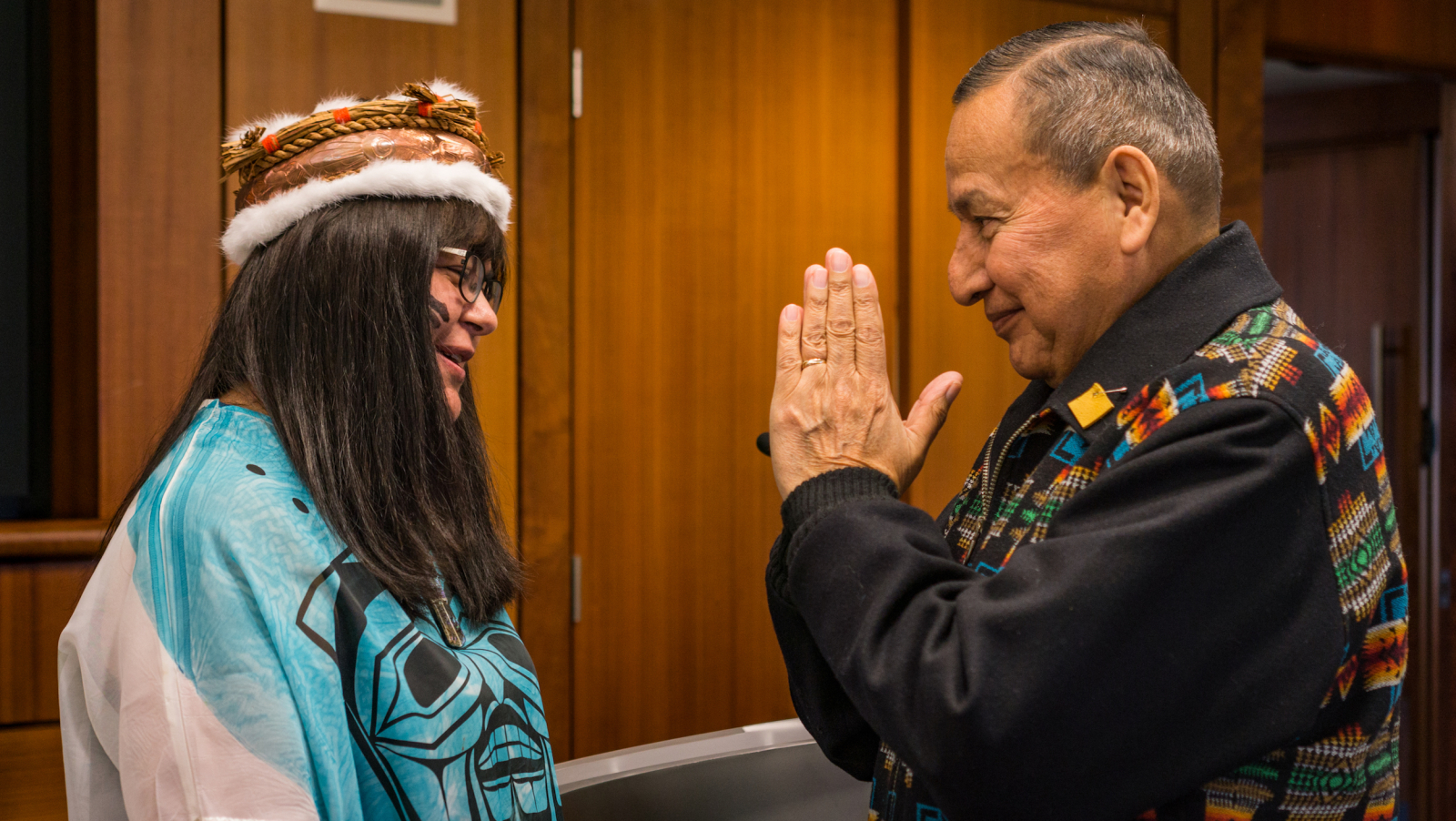
In Alberta, United Conservative Party Leader Jason Kenney, a critic of Bill C-48, claimed that the act would mean "foreign oil can be imported into Canada by tankers, but we can't export it off our northern coast."
Alberta Premier Rachel Notley has also criticized Bill C-48 for banning bitumen, the heavy oil that is mixed with sand in large quantities, beneath the boreal forest in the northern part of the province.
First Nations have built a sustainable ocean-based economy and established marine protected areas in the world-renowned Great Bear Rainforest and Gwaii Haanas National Marine Conservation Area. An oil spill would be catastrophic for ecologically-sensitive areas, local fishing and tourism economies, and the culture and well-being of First Nations communities, leadership wrote in a press release published by Coastal First Nations Tuesday morning.
"Coastal First Nations have a multi-million dollar marine economy," wrote Chief Gary Reece, in an article on the Oil Tanker Moratorium Act, published on Tuesday. “Lax Kw'alaams has the largest fishing fleet on the coast and a state of the art cannery. We are not willing to trade our marine economy for a boom and bust industry. We must ensure we protect the marine-based industries that we all rely on."
“As First Nations we have made this area our home for more than 14,000 years and have a collective responsibility — along with all British Columbians and Canadians — to protect our lands, waters and resources in the Great Bear Rainforest,” wrote Haida Hereditary Chief Gidansda (Guujaaw) who also co-authored the article. “We have a sacred trust that we must carry out. It is our duty to take care of the planet and to leave a legacy of a healthy planet for future generations. Our communities have Aboriginal Title and Rights to the lands and waters in our Territories. This includes the right and responsibility to maintain and to protect the resources within our lands and waters.”
"When the tide's out, the table is set," says Haida Fisheries Technician Vanessa Bellis. "I couldn't imagine not being able to harvest our traditional foods - it would be a catastrophe." Video by Coastal First Nations
Editor's note: This article was updated at 6 p.m. ET on Dec. 4, 2018 with new comments from Transport Canada as well as some additional background information. It was updated again at 9:01 p.m. ET to correctly identify Delphine Denis as a spokesperson for Transport Minister Marc Garneau.


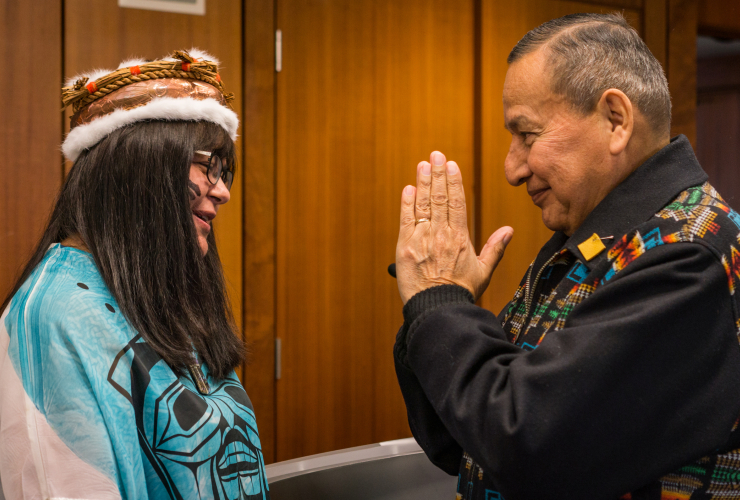
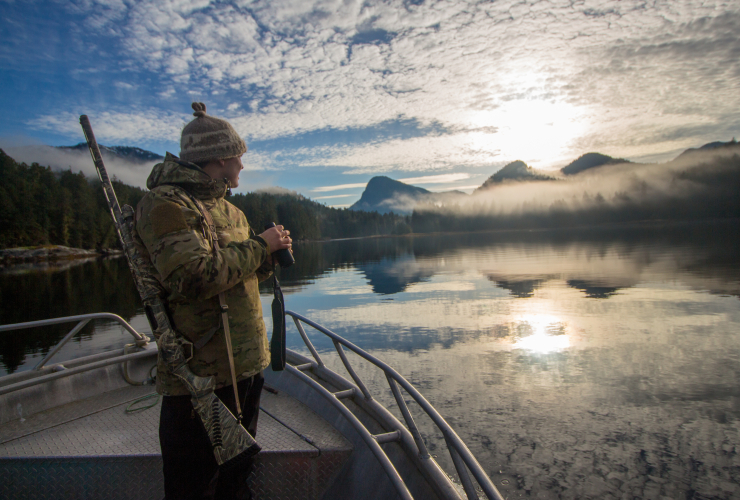
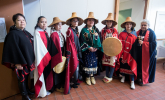
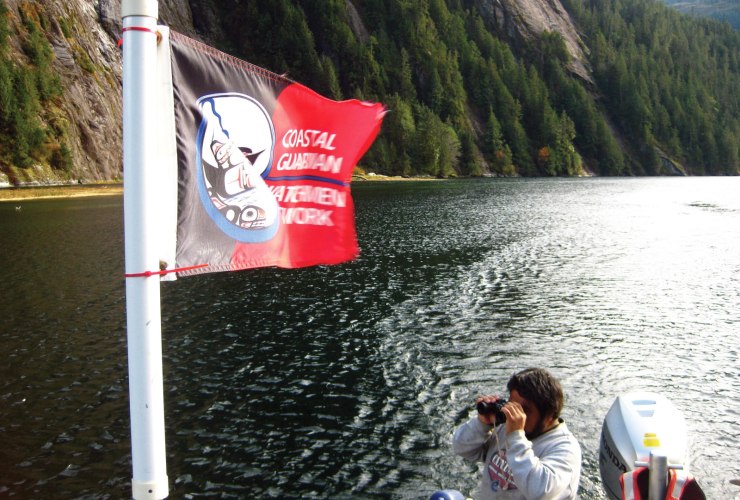
Comments